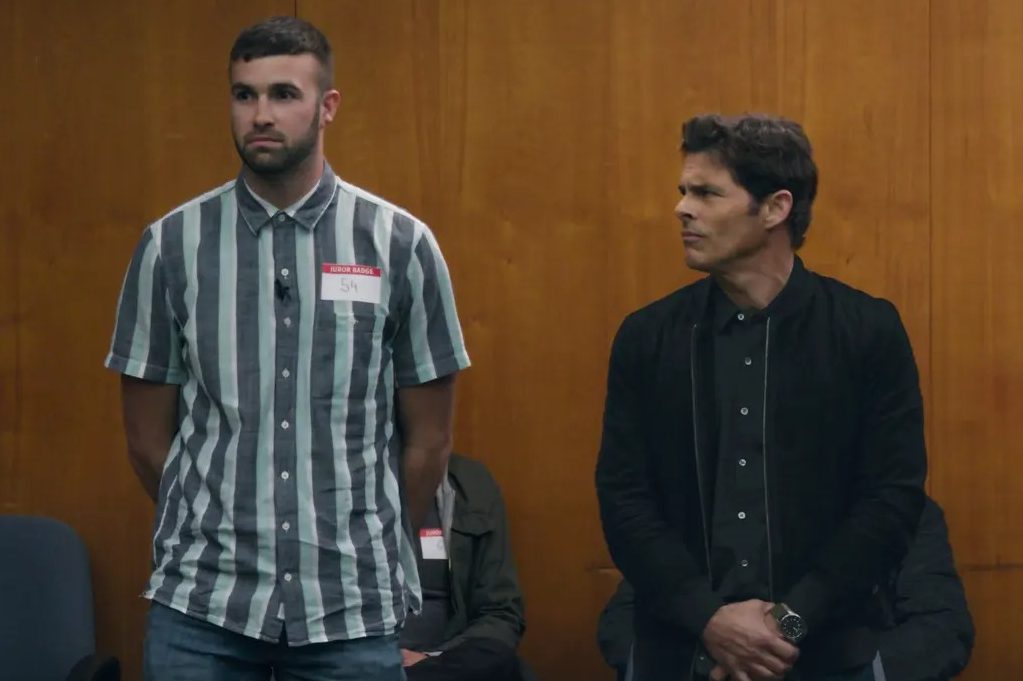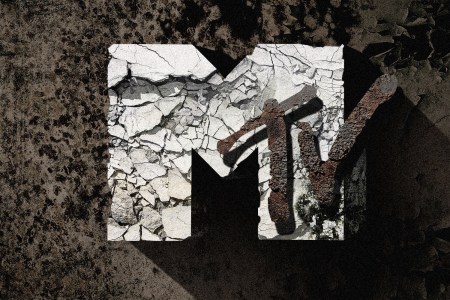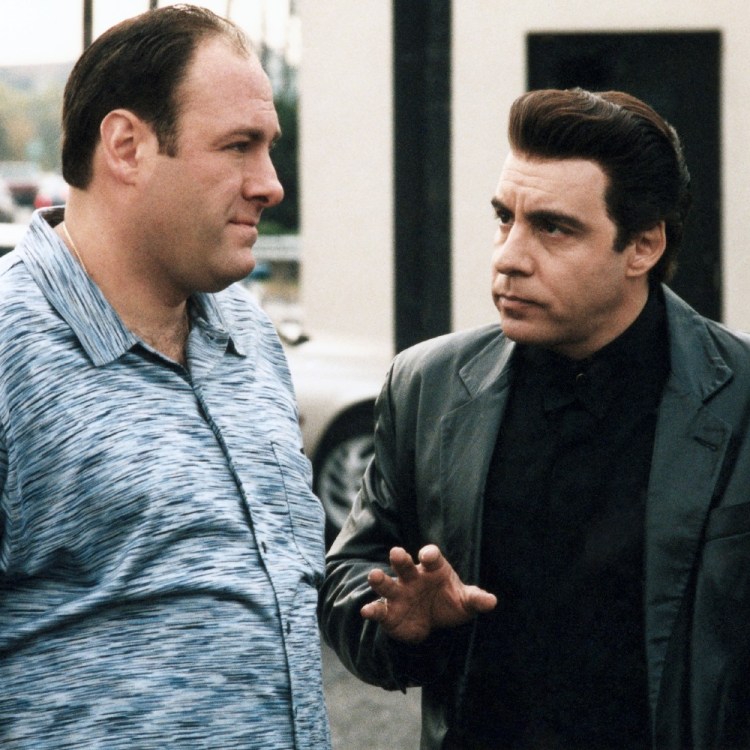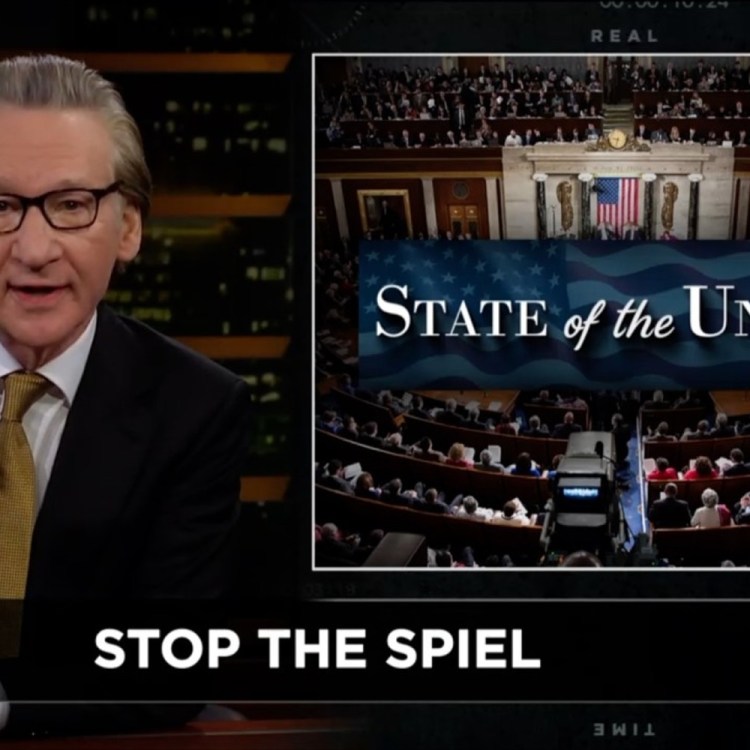In the final scene of Peter Weir’s 1998 film The Truman Show, the film’s central character, Truman (Jim Carey), sails to the edge of his reality. Living his life unwittingly on television, the subject of a popular serialized reality show where he doesn’t know he’s the lead, Truman, after some growing suspicion about his circumstances, boards a sailboat, a boat wryly called the Santa Maria, to find a “new world.” Troubling Chris Columbus metaphors aside, by the time Truman rams the boat into the edge of the show’s set, the film asks hard questions about the nature of our reality, the ethics of how we consume media and the furtive, terrible thrill of surveillance, this voyeuristic looking into the lives of unwitting participants.
If Weir’s film has much to tell us about the rise of reality television and its implications for lives lived under the canopy of constant recording and broadcasting, Freevee’s recent “reality show” Jury Duty makes the dystopian threat of The Truman Show, pardon the pun, a reality. In the show, an unwitting Ronald Gladden (playing himself), signs up for a reality show about jury duty. He doesn’t know that everyone on the show with him is an actor, that the producers would carefully coordinate a plot, and that the show’s set pieces would put him in uncomfortably hilarious situations and ridiculous moral quandaries. It’s one part The Rehearsal and one part The Office. It just might be the last reality show.
For instance, if you’ve ever wondered if the average person on the street would take responsibility for actor James Marsden’s (played by James Marsden) gigantic, toilet-clogging shit, Jury Duty attempts to suggest an answer: We’ve reached the end of reality television. No longer satisfied with the thrill of watching what reality television scholar Olivia Stowell calls “non-actors in contrived situations under surveillance,” Jury Duty proves we need more.
Stowell’s definition of “reality television” draws on scholar Misha Kavka’s description of the genre as “unscripted shows with non-professional actors being observed by cameras in prefigured environments.” This entertainment cocktail worked so well, we’ve been made sick by years of consuming this delightful garbage, searching for the dopamine-inducing thrill of something we’ve never seen before. Jury Duty reveals viewers might want actors running lines, the plot under the umbrella of production control, and one person, totally unaware, thinking he’s living out the humble weirdness — and it gets very weird — of his one private life, while we gawk and laugh behind our screens. If we once tuned in to see something “real,” now we want almost all of it to be obviously contrived.
And the show really works. It’s cringy, hilarious, sweet and brain-breaking, as it probes the limits of contrivance and meta-commentary on what we mean when we say something is “reality television.” Part of the show’s uncanny delight, like The Rehearsal, is the lengths to which the show goes to create the illusion. If we’re honest, the depth and intricacy of the deception is part of the fun.
MTV Is Stuck in Time. How Long Can It Survive?
As “The Challenge” returns for a 35th season, the network is reckoning with an aging talent pool and more competition than everMore than that, for Jury Duty to work, we must crave a pure, unwitting reality participant, someone who doesn’t know the rules of the game, who isn’t a student of the very show or culture of reality television they’re participating in. Ronald appeals to viewers, in part, because he doesn’t seem thirsty for fame: He signed up for a show about a civil jury, not The Bachelor or Love is Blind. He just isn’t that kind of sociopath.
You don’t get the sense that Ronald expected Insta followers out of this, though he now has 133,000 of them. His bio reads, in part, “debunked the myth that nice guys finish last,” and the show encourages us to see him as someone who is “there for the right reasons,” in part because he doesn’t exactly know why he’s there at all. The perversity of the thrill in the show expands under the intersection of Ronald’s ignorance and his earnesty. He isn’t just misled about his circumstances; he seems uniquely vulnerable to them.
True, Ronald has “signed-up” for a show in Jury Duty, but it isn’t the one he thinks it is. The show tries gamely to bill itself as a comedy — both in the sense that it’s quite funny and that it tries to land the notion that Ronald shouldn’t or wouldn’t be mad when the producers reveal the deception. Ronald makes seemingly real relationships with the cast members, as they live and work together over a span of weeks, which transforms the looming revelation that the trial is a fake into something like watching a child slowly find out Santa Claus isn’t real. But if you’ve listened to the This American Life episode where the parents go to extreme lengths to convince their increasingly-too-old son that Santa is real, Jury Duty feels way more exploitative than that.
None of these observations about the pure horror and utter perversion of Jury Duty should be confused with the notion that reality television was once a decent and moral genre. While many consider Bunim and Murray’s MTV Real World to be the first modern reality television program, Cops debuted nearly three years before the seven strangers met in New York City to film what became MTV’s breakout hit. And if Cops is the originator of the modern genre, one of the longest-running and popular iterations, we might think a bit more critically about what we’re watching when we watch reality television. We might see a bit more clearly the relationship between capture, surveillance and humiliation which makes all reality television possible.
We don’t enjoy reality television only because it’s unpredictable, wild and full of people we aren’t and would never be, doing and saying absurd and obscene things we would never do or say: We watch because we like the control. We like that they’re stuck in front of this camera, trapped in this stupid house or on this set or in this mansion or island or pod or courtroom. We watch because we like to watch captured people stay captured.
In one wonderfully hilarious scene, James Marsden (James Marsden) asks Ronald to run lines for Marsden’s potential role in the made-up film Lone Pine by an unnamed-but-maybe-canceled famous director. Marsden, playing himself playing the character he’s auditioning for, tries to the fake blue collar sensibilities of the potential role, while Ronald stiffly reads the scene partner’s lines. Ronald is a terrible actor. Marsden gives him notes, which Ronald takes, only marginally improving his earnest, wooden delivery.
The joke, the show seems to say, is on Marsden, who plays a satire of himself, the posh, Hollywood pretty boy, desperately trying to do method-acting-lite to transform into a rugged, masculine cowboy. Actors, they’re insufferable, we chuckle. Marsden is one of the real comedic lights of the show, as we enjoy his inability to help himself and the needs of his ego. But the more insidious role of this scene is to assure the viewer that Ronald can’t act. The brain-breaking quality of the scene is watching Ronald, usually at ease, charismatic and witty, become so stiff when he’s running lines. The producers need us to know that Ronald is no actor, and the reality we’re seeing in the courtroom and at the hotel is the real Ronald. He can’t be any other way. When he tries to act, it’s a joke.
Watching Ronald grow slowly closer with Marsden over the course of eight episodes should trouble the viewer, knowing Ronald is completely vulnerable to the deception. Marsden has no trouble playing a character a bit like himself, but Ronald only plays himself. Ronald takes responsibility for Marsden’s fake, toilet-clogging shit, if you’re wondering, in one of the many small, moral moments where Ronald turns out to really be kind, selfless and thoughtful. The producers delight in placing this sweet ingenue in the teeth of absurdity, watching him do the right thing, even when it’s awkward or uncomfortable.
Ronald isn’t a saint — he jokingly suggests in the show’s first episode, referencing a bit from Family Guy, that the only sure-fire way to get released from jury duty is to say you’re racist. Mekki Leeper’s Noah, playing a bungling nice guy, not unlike Ronald himself, briefly claims to be a racist, nearly outing Ronald as the source of this tactic under questioning from the judge during voir dire. Ronald squirms.
Then we watch castmate Jeannie Abruzzo (Edy Modica) jokingly give Ronald shit about it in a fake confessional interview. They end up laughing together, the picture of a developing friendship, which feels almost as uncomfortable as the courtroom squirming. Modica, plays Jeannie, the weirdo, sexpot, comic relief, who befriends Ronald in pursuit of a connection with Noah, but the friendship for Ronald is real.
When the producers have the judge, played by the very excellent Alan Barinholtz, reveal the show’s deception to Ronald, they call him a hero. They tell him he’s won $100,000 for some reason. Cast members describe their organic feelings of affection for him, which developed alongside the show’s misdirection and contrivance. Is it possible for an actor to fall for an unwitting scene partner? Is it possible for an audience to love the machinations of a show which feels so exploitative? The show seems to give us a permission structure to say, “Yes?”
As desperately as they don’t want Ronald to feel bad about being misled, the producers and actors don’t want the viewer to feel guilty at our complicity in watching it. Giving us some kind of moral cover for what has been the show’s unique thrill — we’ve loved watching sweet Ronald get lied to; we’ve loved watching him squirm; we’ve delighted in his difficulty, and we hope he’s not too mad about it.
On the show, Ronald takes the reveal well — not walking out or cursing at the castmates or producers. He seems awestruck, as the show’s producers and cast love-bomb him with flattery through the process of showing him the control room and the many times they almost blew the deception.
It almost works. In the days after the show stopped filming, Ronald, in his recent press interviews, confessed to paranoia, not being sure what was real, wondering where the cameras might be. Could the show have had another deception built into the first one? Was he on or off television, and how would he know? In the depths of his paranoia, he messaged Marsden, who he now calls a real friend, who helped him cope with the psychic destabilization of the show and its aftermath. “I got Truman Show’d in real life,” Ronald reflects, though it’s hard to tell whether he’s flattered or bewildered. He told TV Guide that he was “embarrassed” not to have picked up on the ruse, but also that he “didn’t stand a chance” against the professionalism and totality of the deception.
Ronald isn’t mad now, even if viewers and fans should be looking at the show a bit more critically. Ronald now broadcasts himself on Cameo, charging $150 a video, though his account is currently on hiatus, putting him on par with Bravo reality celebrities like James Kennedy. For a price, you can now have Ronald running your lines, making you a miniature producer in the long-tail of Ronald’s strange, unasked-for-but-now-definitely-arrived fame.
It’s hard to know whether to feel too badly about it. Much of what we’ve come to love on reality television is already heavily produced, with casting directors looking for psychographic angles in the building of the cast, shit-stirring producers encouraging wild behavior, fueled by alcohol, sleep-deprivation and uppers to balance it all out. If twisted contrivance is the hallmark of reality television, Jury Duty might not be its end but its logical conclusion.
In The Truman Show, Truman rejects the show in the end, an act the film suggests is heroic. Truman seems to walk like a savior on the surface of the water, rejecting pleas to stay from the show’s producer, played by the delightfully terrifying Ed Harris. When Truman turns and walks through the black hole of a door to whatever lies backstage, the audience — and we imagine this to be the highest-rated series finale in history — of the show, watching in bars, bathtubs and a police station, cheers.
The audience of the film cheers, too. Our hero chooses reality over facsimile, a true existence over a contrived one. Weir, always more comfortable wielding tragedy than comedy, gives the last line to the cops watching the show’s finale telecast cut to fuzz: “What else is on?” they ask, before searching for the TV Guide. We are helpless gawkers, doomed to look for our next perverse entertainment.
This article appeared in an InsideHook newsletter. Sign up for free to get more on travel, wellness, style, drinking, and culture.

























